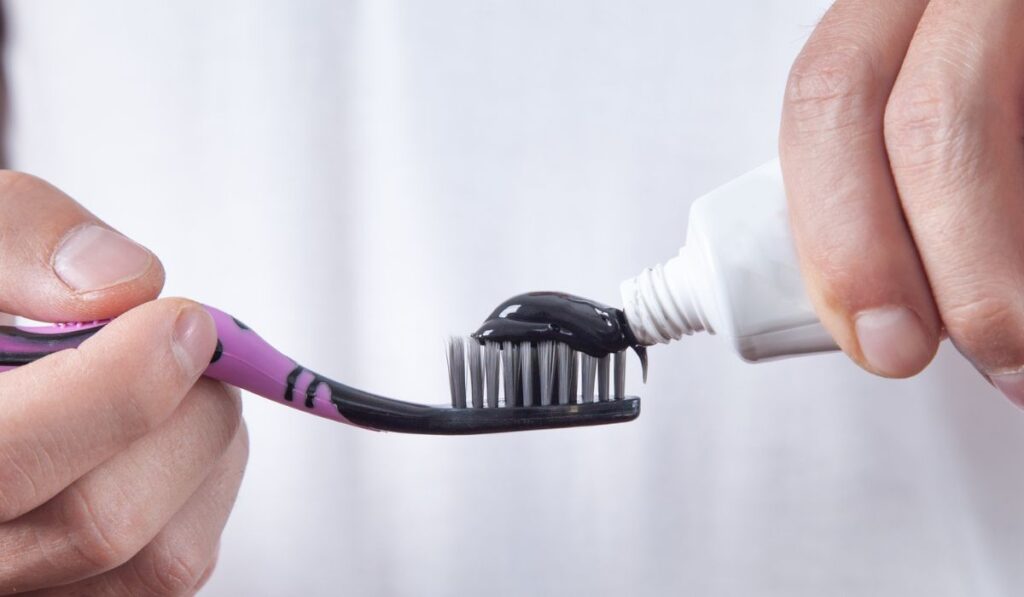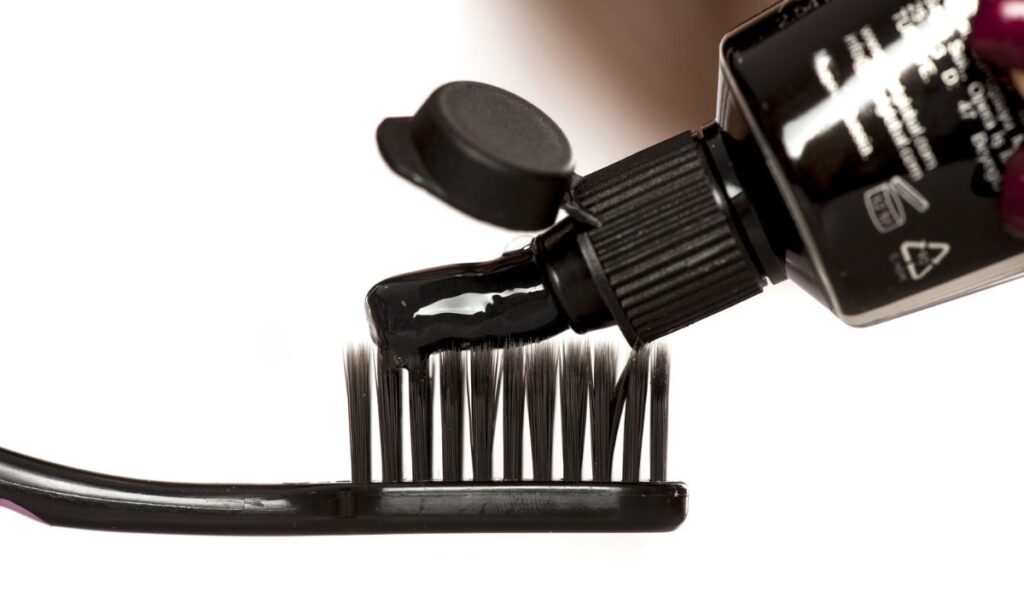Charcoal toothpaste has become the new sensation in dental care, with many people swearing by it for its supposed whitening effect without taking time to find out if it poses any risks to our dental health. So, is charcoal toothpaste dangerous to use for whitening teeth?
Charcoal toothpaste is risky for whitening teeth because rather than using a chemical means, it employs a mechanical means where it scrubs and erodes your teeth. Since charcoal is abrasive, it wears out your enamel with overuse, exposing the underlying dentin and making your teeth more sensitive.
Now that we know the risks of using charcoal toothpaste to whiten teeth let’s look at other side effects and some better ways to whiten teeth without jeopardizing our oral health naturally.
Why do People Use Charcoal Toothpaste?

At first glance at the black color of charcoal toothpaste (on Amazon), it might seem absurd that people actually use it. But, interestingly, charcoal does have a history of being used as toothpaste.
It was used for scouring and cleaning teeth by ancient Romans, the English middle-class of the 18th century, and even some people in developing countries nowadays. It’s now being lauded as a natural teeth whitening method by many people.
While masses ride the wave of this trendy toothpaste and heap praises on it, there aren’t many scientific studies to back or disapprove of the miraculous teeth whitening benefits that charcoal toothpaste boasts.
What’s apparent, though, is the advancements we’ve made since the centuries when people used charcoal for dental care. Exploring natural and simple products for a better lifestyle isn’t such a bad idea, but in the case of charcoal toothpaste, some consequences could arise from its use.
Is it Safe to Use Charcoal Toothpaste?
Charcoal toothpaste isn’t safe for daily use as it’s too abrasive. Its grittiness enables it to remove surface stains and plaque from teeth, but it’s so harsh that it wears down your enamel.
This exposes dentin, a calcified yellow tissue, and your teeth may start appearing more yellow. Scrubbing the surface enamel also makes your teeth more sensitive.
Additional research is required to determine the long-term effects of using charcoal toothpaste. Dentists should advise their patients to be wary of activated charcoal toothpaste due to several safety concerns and unproven claims.
What are the Side Effects of Using Charcoal Toothpaste?
Here are a couple of side effects associated with the long-term use of charcoal toothpaste:
Stains Teeth and Dental Restorations
Tiny charcoal particles could build up in the cracks and crevices of older teeth. They could also accumulate between dental restorations like crowns, bridges, veneers, and white fillings, leaving hideous gray-black outlines.
Wears Down Gums
Charcoal toothpaste’s abrasive properties are also harmful to your gums. Frequent use of charcoal toothpaste wears down your gums leading to more dental problems. If things get out of hand, you could even need a gum graft to replace the eroded tissue.
Makes Your Teeth More Sensitive
Another side effect of the abrasive nature of charcoal toothpaste is that it erodes the enamel with time, and the thinner it gets, the more sensitive your teeth become.
Charcoal Toothpaste Causes Irritation
The powders and activated charcoal present in charcoal toothpaste may irritate some people’s mouth’s soft tissues. Charcoal toothpaste can also irritate cuts, ulcers, or abrasions in your mouth.
Leads to Tooth Decay
Since most charcoal toothpaste brands don’t contain fluoride, it could be linked to increased tooth decay. Fluoride is essential to keep your enamel strong and protect your teeth against decay and cavities.
Makes Teeth Appear Yellow
When the charcoal wears out the enamel, it exposes the underlying dentin, a yellow tissue. This, in turn, makes your teeth look yellowish rather than whiter.
Does Using Charcoal Toothpaste Help to Whiten Teeth?
The activated charcoal in the toothpaste uses its abrasive and absorbing properties to help remove superficial stains on your teeth and leave them whiter. However, there’s no evidence that charcoal toothpaste affects stains below the enamel or has a natural whitening ability.
A product must work on extrinsic and intrinsic stains to whiten teeth successfully. Extrinsic stains are the discolorations that affect the outermost layer of the teeth and are caused by coffee, tea, wine, and tobacco products.
On the other hand, intrinsic stains are those below the enamel and are caused by overexposure to fluoride, certain medications, or underlying medical conditions. However, it can also be just the natural color of the person’s teeth and not caused by anything.
Although charcoal toothpaste has some proven benefits, there’s still not enough scientific proof to back its teeth whitening claims.
What Are Some Better Options for Natural Teeth Whitening?

Tried and tested teeth whitening methods remain unparalleled despite the emergence of trends like charcoal toothpaste. This is mainly because they genuinely work!
Research shows that using ADA-approved products is the most effective way to whiten teeth. They contain hydrogen peroxide, blue covarine, and microbeads which can yield an incredible whitening effect after use.
Other ways to whiten your teeth include:
- Standard whitening toothpaste that removes surface stains without being too abrasive. It should also contain fluoride to keep your gums and teeth healthy, and gum detoxifying ingredients to neutralize gingivitis around the gum line.
- Whitening strips to tackle both extrinsic and intrinsic stains.
- Scheduling in-office whitening programs that safely whiten teeth without damaging the enamel.
Practice Healthy Dental Habits
Observing healthy dental habits is essential too in ensuring you keep your teeth white naturally or maintain the brightness of recently whitened teeth. Here are some ways to ensure your pearly whites are always nice, bright, and healthy:
- Visit your dentist frequently (every six months or so) for cleanings and checkups.
- Brush your teeth twice a day for two minutes.
- Use an ADA-approved whitening toothpaste.
- Steer clear of foods like red wine, coffee, and tea that stain your teeth.
- Floss your teeth daily.
- Avoid vaping and smoking or chewing tobacco.
Adhering to these habits will not only brighten your smile but also prevent cases of cavities, tooth decay, bad breath, gum disease, and other oral health issues.


